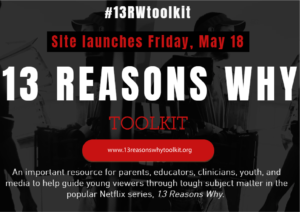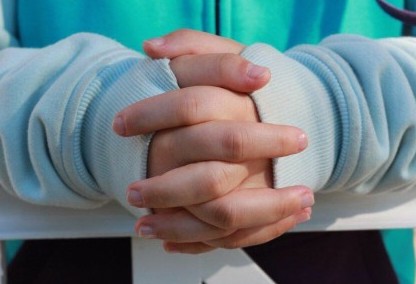13 Reasons Why Toolkit [web resource] [downloadable]
 Along with the release of 13 Reasons Why season 2, Suicide Awareness Voices of Education (SAVE) has coordinated with two dozen mental health organizations to develop a website, 13reasonswhytoolkit.org, that contains information, resources and toolkits for youth/peers, parents, educators and clinicians/professionals for families to address the specific topics raised in the episodes.
Along with the release of 13 Reasons Why season 2, Suicide Awareness Voices of Education (SAVE) has coordinated with two dozen mental health organizations to develop a website, 13reasonswhytoolkit.org, that contains information, resources and toolkits for youth/peers, parents, educators and clinicians/professionals for families to address the specific topics raised in the episodes.
The Netflix series 13 Reasons Why captured the attention of youth globally and created countless discussions among teens and some between teens and their families about suicide, mental health, bullying and more. Concerns were raised by mental health advocacy groups and experts about whether the series presented risks to some viewers because of how the show addressed some of these important and complicated issues.
In response to the first series, the JED Foundation and Suicide Awareness Voices of Education (SAVE) developed talking points to assist parents, teachers, and other gatekeepers in talking to youth about suicide as it relates to the situational drama that unfolds in 13RY. Netflix posted these talking points along with crisis services and a link to additional information about young adult mental health on Netflix’s 13RY resource website.
SAVE published the following recommendations to parents, educators and professionals:
- For vulnerable and at-risk youth (for example those living with depression or an anxiety disorder) we encourage families to make a thoughtful decision about whether or not to watch 13 Reasons Why because of the triggering impact it might have on them. We recommend using the show’s TV rating as a source of guidance about the intensity of the content. Some of the story lines could be quite upsetting and result in them needing additional monitoring, support and/or treatment.
- If your teens do watch the series, make an effort to watch with them. This will allow you the opportunity to monitor the impact the show has on your child. It also affords you the chance to talk after each episode and ensure that they are comfortable enough to continue watching.
- If you are not able to watch together, talk with your teens about their thoughts, reactions and their feelings about the content. Check in with them multiple times as it can take a few days to process the content and they will likely continue to talk about the show with their peers. Let them know that they can come to you with questions or worries about themselves or their friends and that you will be there to listen and help guide them.
- Reassure youth that fiction and reality are not the same thing. Even though some might believe that what they have seen on television is or feels like reality, it is critical that you help them understand it is not and that the outcomes from the series do not have to be their outcomes.
- Learn what resources are available in your local community where you can find help if needed. These might include: a local public health agency, a mental health professional, the counselors in your child’s school, or a crisis phone service in your area. Knowing who you can reach out to for support is a good prevention strategy.
For additional guidance, resources, and research, see the website 13reasonswhytoolkit.org.
A screening can help you determine if you or someone you care about should contact a mental health professional. Care Coordinators can arrange a free 30 minute Care Consultation so you can explore options with an expert. Call or email our Care Coordinators at 650.688.3625 or careteam@chconline.org to set up an initial Consultation appointment.





